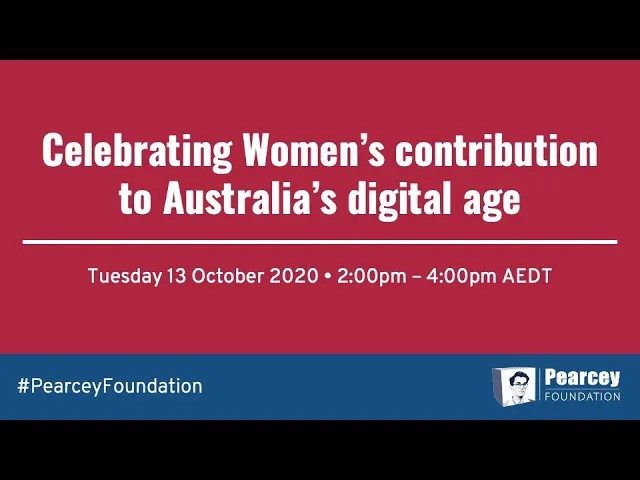Celebrating Women's Contribution to Australia's Digital Age
Pearcey Conversations online seminar 13 October 2020 celebrated the amazing contributions of female Australians to the digital age. Held on Ada Lovelace Day and supported by the Tech Girls Movement Foundation.
This conversation shared many experiences and insights from a mix of outstanding Australian female IT pioneers, academics, practitioners and historians. The discussion recounted some fascinating early history when computing was still in its infancy and the inspirations and qualities that women bring to high technology fields. Through to more modern achievements, challenges and motivations for females at the leading edge of mathematics, statistics, analytics, computing, business and academia.
Speakers included:
- Alison Harcourt AO – Esteemed Mathematician and Statistician, Author
- Kerrie Mengersen FAA – Distinguished Professor of Statistics, Queensland University of Technology
- Chelle Melbourne - Entrepreneur, Digital Strategist, Director
- Dr Ann Moffatt - Academic, Consultant, Founder of Females in IT and Telecommunications
- Helen Vorrath – Technologist, Consultant, Historian
- Barbara Cameron - Software Pioneer, Feminist, Author
- Dr Michelle Deaker - IT entrepreneur, Venture capitalist, Mentor
- Jan Kornweibel - Programmer, Consultant, Autism Academy for Software Quality Assurance
Moderated by Kelly Hutchinson – Deputy Chair of the Pearcey Foundation and Founder of DSI Australia
Barbara Cameron
Barbara Cameron, born 1931, studied Applied Physics at MTC, now RMIT, while working in Melbourne as a lab assistant at the Defence Research Laboratories, with Dr Sweitzke from Max Plank Institute. After time out with four children she investigated the new computer industry in 1969 and started with Shell Oil as a computer programmer using COBOL and PL/1 in the areas of refinery, marketing, payroll and accounting software for the IBM mainframe. She designed software for the first personal computers in Shell in early 1980s. Barbara then retired in 1986 and established Pixels Software for the hospitality industry. Later on she sold this, travelled and painted the outback.
Barbara’s part-time feminist activities cover B.A. La Trobe University in Women’s History, Women’s Electoral Lobby, Queen Victoria Women’s Centre and is currently website developer for WEL Victoria. She is the author of The Host Behind: The Establishment of a Victorian Women’s Centre; “The Flappers and the Feminists. She contributed to the study of women’s emancipation in the 1920s” in Worth Her Salt, Bevege; and “From Charleston to Cha-cha” in Double Time, Lake and Kelly.
Dr Michelle Deaker
Venture capitalist and former IT entrepreneur
Alison Grant Harcourt AO
Jan Kornweibel
Michelle Melbourne
Dr Kerrie Mengersen
Distinguished Professor of Statistics, Queensland University of Technology in the Science and Engineering Faculty
Dr Ann Moffatt
Ann Moffatt (born 1939 in England). She showed a remarkable aptitude for maths and became one of the UK’s first female computer programmers.
In the 1960s Moffatt led the way in Teleworking while working with the FI Group in the UK, a group created to allow women programmers to work from home while raising their children, on projects such as writing programs to analyse the Concorde black box whilst the airplane was in development. Computer Sciences Australia recruited Ann in 1974 to advise on database developments for AMP, soon after she was appointed an Executive at AMP.
Ann was the Director of the Institute of Information Technology at the University of NSW from 1989 to 1992, and expanded the Institute to undertake training and AI and Metrics research for Digital as well as training for Apple.
In 1989 Ann was instrumental in the formation of Females in Information Technology and Telecommunications (FITT), which is a highly successful self-help network for women in the ICT industries.
She had difficulty retiring but now lives the quiet life in subtropical Queensland.
Jennifer Seberry
Emeritus Professor, School of Computing and Information Technology, Faculty of Engineering and Information Science, University of Wollongong
Helen Vorrath
Helen Vorrath is an experienced IT and management consultant whose broad range of skills derives from more than fifty years as an IT professional and from Helen’s management roles in small and large organisations. She has worked as a consultant in all levels of Government, for government agencies and utilities undergoing privatisation and outsourcing, and for NFP organisations. Her experience in the education sector includes reviews of administrative systems for three Universities. An experienced workshop facilitator, Helen has also been a lecturer and written distance education material and a textbook. Helen holds a BSc, BA and MBA, all from the University of Melbourne.
In addition to a range of executive management positions, Helen has held non-executive directorships of several statutory authorities and private companies.

related posts
- Predictions for 2022 and Beyond
- Her Story: Partnerships between Humans and Machines
- Impact of Data Sovereignty on Cybersecurity and Reliability
- Tech Scribes - Telling the Stories of Digital Disruption
- Australian Sound Engineering
- Technology Predictions for 2021 and Beyond
- The History and Future of Wi-Fi: from Radiata to Morse Micro to Beyond!
- Tertiary Computer Science - Preparing Future Leaders?
- Role of the ICT Community in the Future Resilience & Self-Reliance of AU
- The History Project: Creating a Virtual Museum
